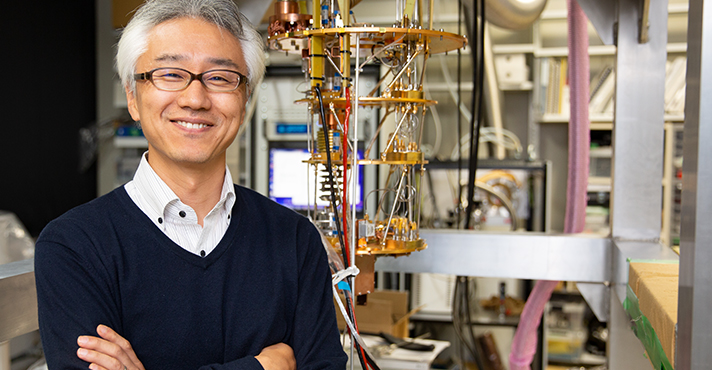
Professor Akira Oiwa, Department of Quantum System Electronics, The Institute of Scientific and Industrial Research
"International joint research on tiny mechanisms making big impact both at home and abroad"
An article by Dr. Akira Oiwa entitled “Single electron charge sensing in self-assembled quantum dots” was recently published in Scientific Reports. Dr. Oiwa and his team have developed the first device based on two self-assembled quantum dots that can measure the single-electron charge of one quantum dot using a second as a sensor.

1. What makes this research so interesting?
Preparation, detection, and manipulation of the effects governed by quantum mechanics are the most compelling challenges in the field of condensed matter physics in the 21st century. Quantum information technology is one field emerging from such challenges. We have successfully detected the tunneling events of single electrons in an InAs self-assembled quantum dot (QD), a small semiconductor island with a diameter of approximately 100nm, by measuring the current through a nearby quantum dot. Although charge sensing has already been realized and has greatly contributed to electron spin qubits in gate-defined lateral QDs, we have demonstrated it for the first time in InAs self-assembled QDs, which are the platform of optoelectronics devices such as lasers. Since this charge sensing technique provides very useful methods for detecting single electron spin and single photons, our achievement is expected to lead to the development of electron spin qubits for quantum computing and quantum interfaces with photons for long distance quantum communications using scalable InAs QDs in quantum information technologies.
2. What is the appeal of international joint research?
This work was conducted in cooperation with a student intern from Ruhr University Bochum who stayed in our group for a half year. Although he was an undergraduate student with no real experience in scientific research, he was very motivated to perform advanced scientific experiments. Indeed, he worked very well and was a positive influence on the other students in my group. I was very glad to hear that he had decided to continue his study of quantum phenomena in semiconductors in a PhD course at his university. I hope that this kind of positive exchange will encourage more talented students from abroad to come to Osaka University and improve the quality of research performed here.

Generally speaking, international joint research is indispensable for conducting advanced research in my field and strengthens the scientific quality and value of research. In fact, I have long collaborated with a research group at Ruhr University Bochum, to which the aforementioned student intern now happens to belong, for the development of high quality quantum structures in semiconductors.
For more information:
http://www.sanken.osaka-u.ac.jp/labs/qse/indexEN.html
Edit: Machiko Mawatari, Christopher Bubb